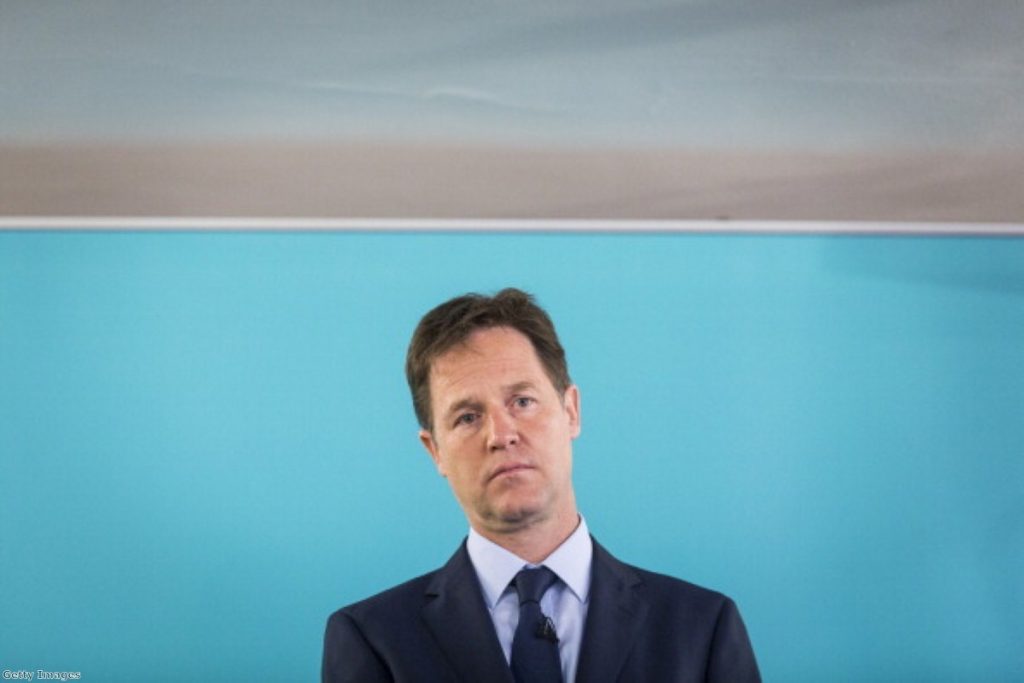The Week in Review: A terrible secret about Nick Clegg
I have a terrible secret. It's a secret I've been carrying around for some time. It's a secret so shameful I don't want to admit it even to myself.
But admit it I must. You see the awful truth is that I quite like Nick Clegg. Not a lot. I don't have a picture of him on my wall and I'll never be the president of the All County Nick Clegg Appreciation Society.
But I do quite like him. All logic dictates that I shouldn't feel this way. All conventional wisdom says that he should fill me with utter disdain. But the truth is that he doesn't. The truth is that I just don't hate Nick Clegg.
The realisation of this shameful secret came to me as I waited to ask him a question at his monthly press conference this week.


Clegg regularly holds these events for journalists. Every month he stands and takes questions from whichever hack wants to ask one, however long it takes. This may seem like a small thing, but in an era of tight media management this is increasingly rare for frontline politicians. It's certainly not a practice that either Ed Miliband or David Cameron employ.
The answers he gave were not particularly exciting. His thoughts on education funding ring-fences and the European Commission are unlikely to grace even the most comprehensive book of quotations.
But the fact was that unlike David Cameron, he was prepared to take questions from more than just a few cohsen media outlets. The fact was that unlike Ed Miliband, he was prepared to answer questions without showing obvious disdain for the people who asked them.
My respect for Clegg also comes out of the nature of his enemies. The fact that he inspires such obvious bile in men like Boris Johnson and Dominic Cummings, suggests to me that he really can't be all that bad.
Of course there's still plenty of reasons to dislike him. His broken promises on tuition fees and his abandonment of many other liberal principles, have rightly brought him ire from both left and right.
But it's hard to think how he differs in this from many other promise-breaking politicians. It's also hard to see why he is so widely hated, when so many equally untrustworthy politicians are not.
So as I sat there waiting to ask my question, I began to feel genuinely sorry for the man. Clegg, who just months ago had still seemed relatively spritely, now seemed utterly dejected and broken.
His eyes were sunken, his skin was pale and his voice was slow and mournful. He looked, as Daily Mail columnist Quentin Letts told him, like a "spat-out smartie".
In fact the whole occasion, had the feel of a funeral, with the only difference being that the corpse had opted to stand up and give his own speech.
The question I had prepared for him was unlikely to change his mood. I wanted to ask why local Liberal Democrat parties were passing votes calling on him to stand down. I wanted to ask him whether he should take this as an opportunity to jack it all in.
But when I raised my hand to ask the question, I did so more out of sorrow than anger. The truth was, that I just didn't hate Nick Clegg.
Britain Last.
The rapid rise of the fascist group Britian First tells us a great deal about modern Britain. Their use of shareable photos of soldiers, animals and little children, has allowed them to gather a mass online following for their extreme and fundamentalist views.
It's a worrying reminder that fascism, when it comes, does not always come with truncheons and jackboots. Fascism when it comes, sometimes comes with smart phones and cat pictures.
Thankfully the group's offline disguises are far less convincing. Their military uniforms and vehicles, their mosque invasions, and their founder's call for a 'holy war' with Islam, should alert most sensible people to the kind of thugs they are.
But the fact they have been able to engage so many people in modern Britain, suggests that we're not quite the open and tolerant society we only recently believed.
There were worrying signs of this fact in the British Social Attitudes Survey released this week. According to the survey, attitudes to immigrants have significantly hardened in the past year. The vision of Britain as a cultural melting pot seems sadly to be melting away.
However, if you look closer it's not all doom and gloom. Delve into the figures and it's clear there are some much more positive long-term generational shifts.
Sadly the rise of Britain First shows that there is nothing inevitable about this progress. Making Britain a more tolerant place, is a fight that will have to be fought again every year.

